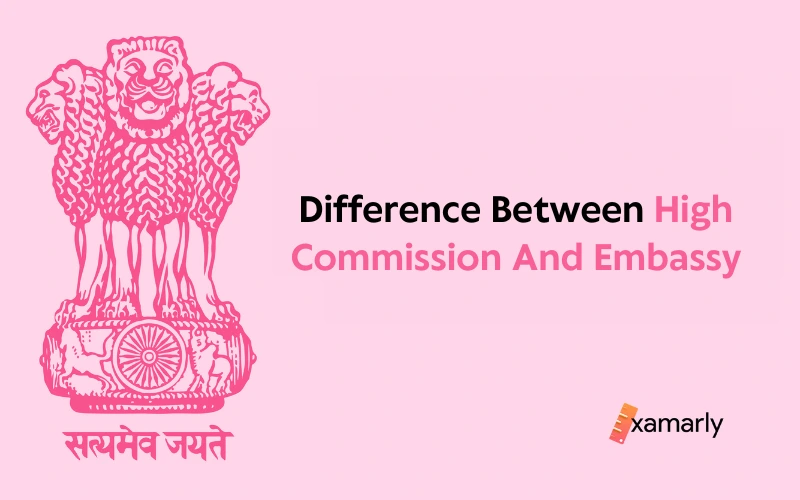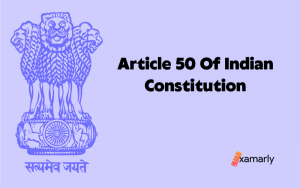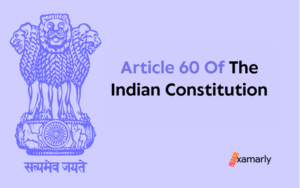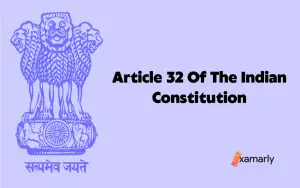An Overview
When it comes to diplomatic representation abroad, two key terms are often used interchangeably: High Commission and Embassy. While both refer to official government offices that represent a nation in another nation, there are some key differences between the two.
In the following article, we will dig deep to familiarise ourselves with the concept of diplomacy. gaining an understanding of diplomatic relations and diplomatic missions.
We will then move on to learning the difference between High Commission and Embassy, their roles and responsibilities, the differences between these two government offices and some frequently asked questions about them.
Understanding The Concept Of Diplomacy
Diplomacy is the way countries interact with each other on an international level. Embassies, high commissions, and consulates are all types of diplomatic missions that nations send to other nations.
These missions have similar responsibilities. These include representing their home country in the host country, protecting their citizens abroad, negotiating with the host country, and building friendly relationships with the host country and other countries.
In simple terms, embassies are offices that a nation sets up in another nation to take care of its interests and its citizens.
Diplomatic Relations
Diplomatic relations refer to the official interactions and communications between different countries or international organisations. These interactions are typically conducted through diplomatic representatives, such as ambassadors or diplomats, who work to promote cooperation and understanding between nations. Diplomatic relations can include a wide range of activities, such as negotiating treaties and agreements, promoting trade and cultural exchange, and resolving conflicts and disputes.
The Importance Of Diplomatic Relations
The importance of diplomatic relations can be understood from different perspectives.
- Firstly, from the perspective of international security, diplomatic relations play a crucial role in preventing conflicts and promoting peace. Countries use diplomatic channels to resolve disputes and negotiate peaceful settlements, rather than resorting to military force.
- Diplomatic relations also help to build trust and understanding between nations, which can prevent misunderstandings and miscalculations that could lead to war.
- Secondly, Diplomatic relations also play a key role in promoting economic development. Countries use diplomatic channels to negotiate trade agreements, attract foreign investment, and promote tourism.
- These interactions can lead to increased economic growth and prosperity for both nations. Additionally, diplomatic relations can also help to promote technological and scientific collaboration, which can lead to advancements in areas such as medicine, energy, and transportation.
- Lastly, Diplomatic relations are also important for promoting cultural exchange and understanding. Countries use diplomatic channels to promote education and cultural exchange programs, which can help to break down stereotypes and promote mutual understanding and respect.
- Additionally, diplomatic relations can also help to protect the rights of citizens abroad, such as ensuring the safety of tourists or working to protect the rights of immigrants and expatriates.
Overall, diplomatic relations play a vital role in maintaining international peace and security, promoting economic development and cultural understanding.
They are a crucial tool for nations to navigate the complex and interconnected global system and achieve their foreign policy goals. In the current rapidly changing world, where the nation’s interests are intertwined and interdependent, the importance of diplomatic or international relations has become even more significant.
Diplomatic Missions
A diplomatic mission is a group of representatives from one country that is stationed in a foreign country to conduct official diplomatic interactions and communications. These missions can take many forms, such as embassies, consulates, or permanent missions to international organisations.
The main function of a diplomatic mission is to represent the interests of the sending nation and to promote cooperation and understanding between nations.
Importance Of Diplomatic Missions
- The first function of a diplomatic or foreign mission is to serve as a link between the sending nation and the host nation.
- Diplomatic missions are responsible for maintaining and developing relations between the two countries, through regular communication and meetings with government officials, business leaders, and other key stakeholders. This can include negotiating treaties and agreements, promoting trade and cultural exchange, and resolving disputes and conflicts.
- Secondly, diplomatic missions also play an important role in protecting the interests of citizens from the sending country who are living or travelling in the host country. This can include providing consular services, such as issuing passports and visas and providing assistance to citizens in distress.
- Additionally, diplomatic missions also play a key role in promoting the rights and welfare of citizens from the host nation who are living in the sending nation.
- Lastly, Diplomatic missions also play a vital role in gathering and analysing information about the host country. This can include monitoring political, economic, and social developments, as well as analysing the foreign policy of the host country.
- This information is used to inform the foreign policy of the sending nation and to develop strategies for interactions with the host nation.
In conclusion, diplomatic missions are an important tool for countries to conduct official interactions and communications with other countries. They serve as a link between nations, promoting cooperation and understanding while protecting the interests of the citizens of both countries.
Diplomatic missions play a vital role in maintaining peaceful and productive relationships between nations, gathering and analysing information and formulating foreign policies. They are an essential component of the foreign policy apparatus of a nation, enabling a nation to achieve its foreign policy goals in an increasingly interconnected world.
High Commission
The High Commission is a term used to describe the diplomatic representation of Commonwealth countries in other countries. The main function of a high commission is to act as a link between the governments of the sending and receiving countries. This includes promoting and maintaining political, economic, and cultural relations, and protecting the interests and citizens of the sending nation.
High commissions also have the responsibility of promoting trade and investment between the two countries and can act as a point of contact for consular services and visa applications. The term high commission is distinct from an embassy and is used only in countries that are part of the Commonwealth, and as such is a diplomatic representation for countries that are members of the Commonwealth of Nations.
In simple words, a High Commission can be understood as a diplomatic mission that seeks to represent one Commonwealth nation in another Commonwealth nation. Commonwealth countries are those that were historically part of the British Empire, such as Canada, Australia, and India. High Commissioners are appointed by the head of state of the sending nation and have the same rank and status as an Ambassador.
Roles And Responsibilities Of A High Commission
- Representing the government of one Commonwealth nation in the capital city of another Commonwealth nation.
- Promoting and protecting the interests of the sending country in the host country.
- Handling many of the same functions as embassies, such as political, economic, cultural, and consular affairs.
- May also have additional responsibilities, such as promoting trade and investment between the sending nation and the host nation.
- Providing services to citizens of the sending country living in the host country.
- This government body is headed by a High Commissioner. This position corresponds to the highest-ranking official in the High Commission.
- Providing visa services to people who wish to visit the sending nation.
- Building and maintaining relations with the host nation.
- Gathering and reporting information on the host country to the sending country.
- Coordinating activities with other diplomatic missions in the host nation.
- Providing assistance to nationals of the sending nation in distress.
- Advancing the sending country’s interests in the host country.
Please note that some of the above-mentioned points may vary based on the policies of the countries and their diplomatic relationship.
Embassy
The term Embassy, on the other hand, is used for a diplomatic mission that represents a non-Commonwealth nation in another nation. Embassies are headed by an Ambassador, who is appointed by the government of the sending nation.
The Ambassador is the official representative of the sending nation and is responsible for maintaining diplomatic relations with the host nation.
Embassies are typically located in the capital city of the host nation and are responsible for a wide range of tasks, including issuing visas, promoting trade and cultural exchange, and protecting the rights of citizens of the sending nation.
Roles And Responsibilities Of An Embassy
- Representing the government of one nation in the capital city of another nation.
- Promoting and protecting the interests of the sending country in the host country.
- Handling political, economic, cultural, and consular affairs.
- Providing services to citizens of the sending nation living in the host nation.
- Headed by an Ambassador, who is the highest-ranking official in the embassy.
- Providing visa services to people who wish to visit the sending nation.
- Building and maintaining friendly relations with the host country.
- Gathering and reporting information on the host nation to the sending nation.
- Coordinating activities with other diplomatic missions in the host country.
- Providing assistance to nationals of the sending nation in distress.
- Advancing the sending nation’s interests in the host nation.
- Promoting trade and investment between the sending country and the host country.
- Advising the sending nation’s government on the host nation’s politics, economy and culture.
- Helping to resolve disputes between the sending country and the host country.
- Helping to resolve disputes between citizens of the sending nation and the host nation.
Please note that some of the above-mentioned points may vary based on the nation’s policies and their diplomatic relationship.
Examples Of Countries With High Commissions And Embassies
Examples of countries that have High Commissions include Australia, Canada, India, and South Africa.
Some examples of countries that have Embassies include the United States, China, France, and Russia.
Difference Between High Commission And Embassy
The main difference between a High Commission and an Embassy is their association with different types of nations.
High commissions are typically associated with Commonwealth nations that were formerly part of the British Empire, while Embassies are typically associated with sovereign states.
Another key difference is the ranking of the Head of the Mission, a High Commissioner in the case of a High Commission and an Ambassador in the case of an Embassy.
Another difference between a High Commission and an Embassy is that High Commissioners are appointed by the Head of State, whereas Ambassadors are appointed by the government. This means that High Commissioners may have a slightly different level of autonomy and decision-making power than Ambassadors. This is a key difference between High Commissioner and Ambassador.
Let us look at some more differences between a High Commission and an Embassy as well as a few similarities between them through the table provided below.
| Point of Comparison | High Commission | Embassy |
|---|---|---|
| Purpose | Representation of one nation in another nation | Representation of one nation in another nation |
| Level of Diplomacy | Official diplomatic representation | Official diplomatic representation |
| Staff | Consists of diplomats and administrative staff | Consists of diplomats, administrative staff, and security personnel |
| Function | Facilitates diplomatic relations between nations | Facilitates diplomatic relations, consular services and protection of citizens |
| Building | Typically located in the capital city | Typically located in the capital city |
| Jurisdiction | Represent only one nation | Represent multiple nations |
| Head of Mission | High Commissioner | Ambassador |
| Flag | Flag of the represented nation | Flag of the represented nation |
| Responsibilities | Representing the nation in a foreign land, particularly in Commonwealth nations | Representing the nation in a foreign land and protecting the citizens of the nation in the foreign land |
| Structure | Similar to an Embassy | Similar to a High Commission |
Please note that this table is showing the general differences and not all the High Commissions and Embassies may be the same in terms of their roles and responsibilities.
Summing Up
- In summary, High Commission and Embassy are two different types of diplomatic representation that nations have abroad.
- High Commissions are specific to nations that are part of the Commonwealth, while Embassies are for non-Commonwealth nations.
- The head of these missions also differs, High Commissioners are appointed by the head of state, while Ambassadors are appointed by the government.
- Both types of missions have similar responsibilities and serve to promote the interests of their respective countries and maintain diplomatic or foreign relations with the host nation.
Check Out Our Other Blogs On Related Topics:
| Difference Between Cabinet And Council Of Ministers | Right To Freedom Of Religion – A Fundamental Right |
| Difference Between Communism And Democracy | States and Union Territories Of India |
FAQs Related To High Commission And Embassy
How Is A High Commission Distinct From An Embassy?
There are a few differences between a High Commission and an Embassy. However, the main difference between them is that High Commissions are diplomatic missions that represent one Commonwealth nation in another Commonwealth nation, while Embassies represent non-Commonwealth countries. High Commissioners are appointed by the head of state, whereas Ambassadors are appointed by the government.
Who Is In Charge Of A High Commission?
A High Commission is headed by a High Commissioner, who is appointed by the head of state of the sending nation. The High Commissioner is the official representative of the sending nation and is responsible for maintaining diplomatic relations with the host nation.
Who Is In Charge Of An Embassy?
An Embassy is headed by an Ambassador, who is appointed by the government of the sending nation. The Ambassador is the official representative of the sending nation and is responsible for maintaining diplomatic relations with the host nation.
What Are The Responsibilities Of A High Commission?
A High Commission and an Embassy may share some responsibilities that might be similar in nature. They include issuing visas, promoting trade and cultural exchange, and protecting the rights of citizens of the sending nation.
What Are The Responsibilities Of An Embassy?
The responsibilities of an Embassy include issuing visas, promoting trade and cultural exchange, and protecting the rights of citizens of the sending nation. Embassies also work to promote the interests of the sending nation and maintain diplomatic relations with the host nation.
What Is The High Commission?
The High Commission is a diplomatic mission headed by a Commissioner or High Commissioner, who represents their country in another sovereign state or Commonwealth realm.
What Is An Embassy?
An Embassy is a diplomatic mission led by an Ambassador, who represents their country in another sovereign state or foreign country.
Is A High Commissioner Higher In Rank Than An Ambassador?
No, both positions hold equal diplomatic rank.
What Is The Difference Between An Embassy And A Consulate?
Embassies serve as the main diplomatic representation in a foreign country, while consulates are smaller diplomatic missions that typically provide specific services to citizens and businesses in a specific region.
What Services Are Provided By A High Commission?
High Commissions provide a range of services including visa and immigration services, trade and investment promotion, cultural and educational exchange programs, and consular support to citizens.
Can Citizens Of A Foreign Nation Apply For A Visa At A High Commission?
Yes, High Commissions often have visa application centres where citizens of a foreign nation can apply for a visa to visit or live in the high commission’s nation.






